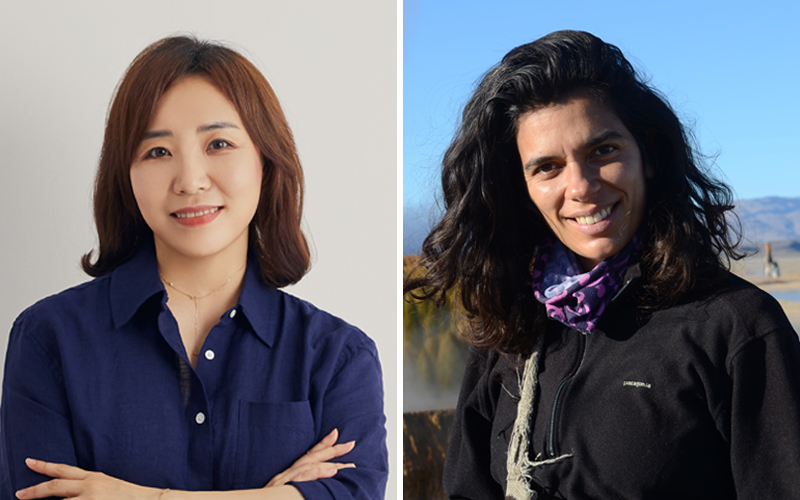 Dr. Sohyun Park (left); MaFe Gonzalez / BASE Landscape Architecture (right)
Dr. Sohyun Park (left); MaFe Gonzalez / BASE Landscape Architecture (right)
ASLA announced that Dr. Sohyun Park, ASLA, PhD, Associate Professor of Landscape Architecture, University of Connecticut, and MaFe Gonzalez, ASLA, Landscape Designer and Botanist, BASE Landscape Architecture, will represent ASLA at the Convention on Biological Diversity (CBD) in Cali, Colombia, October 21-November 1.
ASLA and its 16,000 member landscape architects, designers, and educators support the Kunming-Montreal Global Biodiversity Framework (GBF) and its key goals and targets. Landscape architects are committed to achieving the 2030 goals and targets, including protecting and restoring at least 30 percent of terrestrial, coastal, and marine ecosystems by 2030 (30 x 30). They also stand behind the Vision for 2050.
“We are advancing 30 x 30 through our projects, research, and advocacy. In our Climate Action Plan, we called for restoring ecosystems and increasing biodiversity on a global scale. This year in Colombia, we will show policymakers how to do it through the latest planning and design strategies,” said ASLA CEO Torey Carter-Conneen, Hon. ASLA.
“Landscape architects are key to translating policy into action and realizing real biodiversity gains in landscapes, particularly in cities,” said ASLA President Kona Gray, FASLA, PLA. “We are uniquely positioned to lead multidisciplinary teams of ecologists, biologists, engineers, and other disciplines to protect, restore, and enhance ecosystems worldwide.”
Landscape architects advance global biodiversity goals by:
- Protecting and restoring ecosystems
- Conserving habitat for species
- Planting native trees and plants
- Protecting and restoring soil health
- Managing invasive species
- Creating ecological corridors
- Mitigating and adapting to climate change
They plan and design projects and conduct research at all scales in urban, suburban, and rural areas.
At the convention, Dr. Sohyun Park will present landscape architecture strategies to increase biodiversity at these events:
Biopolis 2024: Living Landscapes and Infrastructure for Healthy Communities, October 22-23, Green Zone. A keynote – Landscape Architecture Solutions to “Halt and Reverse” Biodiversity Loss – on October 22 at 8:50 AM COT.
Every Construction Project Is an Opportunity to Protect Biodiversity, October 26, 4-5 PM COT, Green Zone, Universidad ECCI Cali (Floor 7, Room 3). A session focused on “proven solutions to support nature that can be adopted at various scales of the built environment.”
MaFe Gonzalez will present these strategies at this event:
Cities to Blossom, October 25, 1 - 2.30 PM COT, Green Zone, Universidad ECCI Cali (Floor 1, Room 8). A workshop focused on “reconnecting children with urban biodiversity through the design of public spaces and educational institutions.”
Last month, ASLA released the results of its first national survey on landscape architects’ planning and design work focused on biodiversity. The survey found that 45 percent of landscape architects have prioritized biodiversity conservation and another 41 percent consider biodiversity part of their organization’s environmental ethos.
Earlier this year, the ASLA Fund released peer-reviewed research on landscape architecture solutions to the biodiversity crisis. The research, which Dr. Sohyun Park developed, reviewed nearly 70 peer-reviewed studies focused on planning and designing nature-based solutions to biodiversity loss published from 2000 to 2023. Explore the findings in an executive summary, which includes case studies and project examples, and a research study.
In 2022, ASLA urged world leaders to commit to ambitious global conservation and biodiversity goals, including 30 x 30. ASLA also joined 340 organizations worldwide in signing the Global Goal for Nature: Nature Positive by 2030.